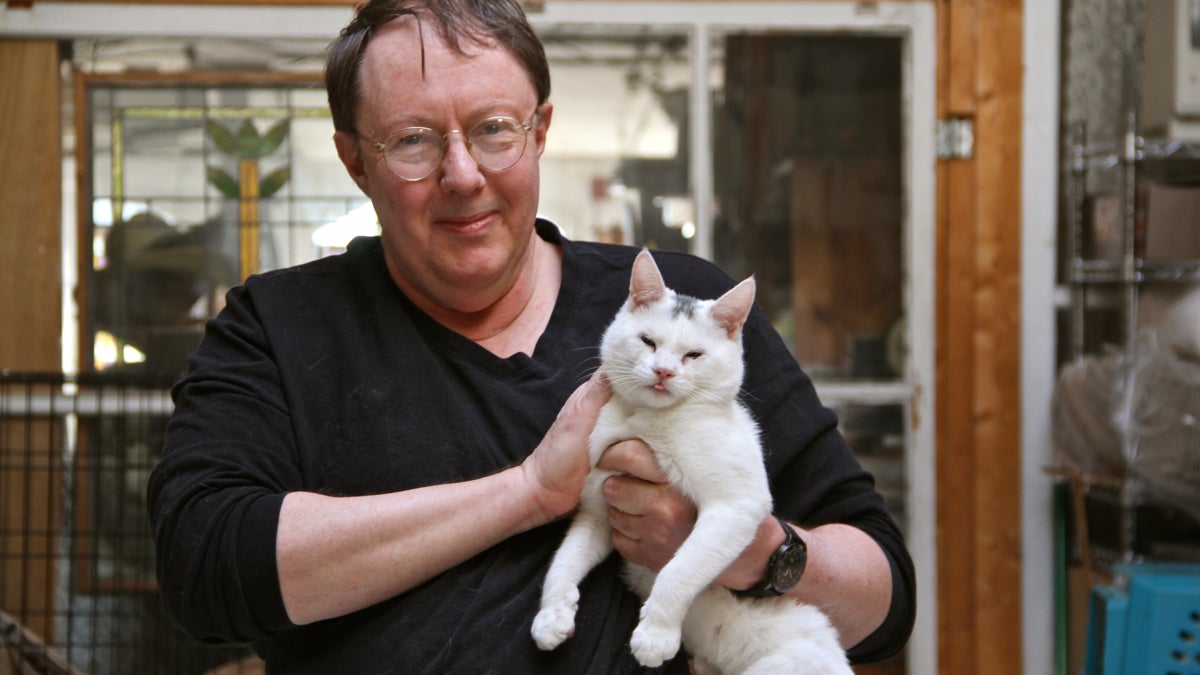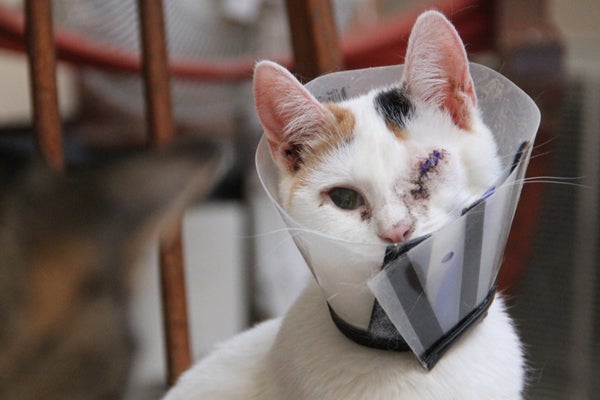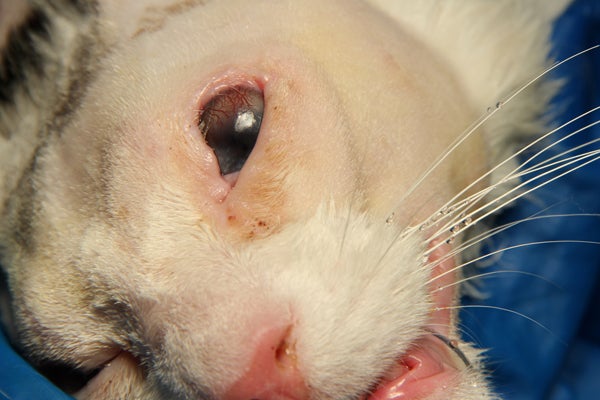How far will we go to help an animal with no owner?
Listen
Al Gury holds Marley, one of the hundreds of cats he has fostered in his Old City home. (Emma Lee/WHYY)
We will do almost anything for our pets when they get sick or injured, but there are often limits, medically and financially, to what we can do for an animal’s health.
In the summer of 2015, Philadelphia’s animal control team pulled two white kittens off the streets in the Overbrook neighborhood. They were Marley and Ramona, brother and sister. After three days in a city shelter, they were turned over to PAWS – Philadelphia Animal Welfare Society.
“They came to us on July 4th. They were Independence Day kittens for us,” said Melissa Levy, executive director of PAWS. “They had infections we see in animals from the street. Upper respiratory, eye infections, they were in pretty bad shape.”
Pretty bad, but infections are not unusual for a street animal, and not too difficult to fix. These cats had bigger problems with their eyes, though. One of Ramona’s eyes was so infected it was bulging out of her skull.

Marley had been born without eyelids. He had a condition called eyelid agenesis, meaning about 75 percent of his eye membranes did not form in utero. He could not close his eyes – not to blink, not to sleep, and not to protect his eyes from dust and dirt.
“That condition is very unusual for us. Typically we see infections that are easily resolved with medication. What Marley had was a genetic deformity in the way his eyelids were formed, that required plastic surgery,” said Levy.
Levy has a Rolodex of a few dozen fosters who will take on cats until permanent owners can be found, but she reserves her special cases for one guy in particular – Al Gury, an artist and chair of the painting department at the Pennsylvania Academy of the Fine Arts.
For almost 40 years, Gury has lived in an Old City loft, which he has outfitted for both his career as a painter, and his life with cats. He has five cats of his own. Next to his easel is a homemade playpen built from plywood scraps to keep sick kittens that he is fostering.
Over the last 10 years, Gury has fostered more than 800 cats in this loft, keeping them for a few weeks or a few months until they can be adopted out. In that time, he has also cajoled numerous colleagues and students to take on a stray. It’s said that you cannot arrive as an artist in Philadelphia until you have one of Gury’s cats. He’s made such a lasting impression at PAWS, that one of their maternity rooms is named after him.
He took on Marley and his sister last July.
“They needed a lot of nurturing, and medical care,” said Gury. “I had to give them a lot of cuddling and holding to make sure they were getting socialized. Give them attention, and medical care – which they hated. Who likes eye drops?”
Gury discovered Ramona’s infection in her right eye was too far gone. It would have to be removed. But Marley’s sapphire-blue eyes were fine, he just didn’t have eyelids.
“I’ve seen him sleep – he just scrunches his eyes,” said Gury in his loft, trying to find Marley (he was hiding behind racks of figurative canvases). “His problem is his eyelashes and his surrounded hair lie flat on his cornea. Also there’s an issue of lubrication and constant abrasion. He would develop abscesses.”
At just a few months old, Marley’s corneas were already showing signs of wear from being in touch with his fur. The easiest way to cure Marley’s eye condition – and the cheapest – would be to remove his eyes altogether.
“I figured, if there was no other recourse, sure. Ramona had to have an eye removed,” said Gury. “But these are perfectly good eyes. Being an artist and an art teacher, it had special meaning to me. How important they are. I was not going to let him lose his eyes.”
Gury wanted the best for Marley, but animal rescue has its limitations. Every year, PAWS rescues, nurtures, and adopts out over 3,000 dogs and cats in the Philadelphia area. Most are cats.
“Unfortunately, our resources prevented us from being in a position to write a blank check and get Marley every possible level of surgical care,” said Levy. “Once we assessed what our limits were and our financial constraints, Al took it into his own hands.”
Gury got in touch with a specialty hospital called VSEC, or Veterinary Specialty and Emergency Center. They formed a plan to give plastic surgery to this stray cat.
“This particular surgery is not rare, it’s super common especially in Philadelphia, where there are a lot of strays,” said Dr. Shelby Reinstein, a veterinary ophthalmologist at VSEC. “Things don’t form right when there is a lot of inbreeding.”
Basically, Marley needed a skin graft. A piece of his inner lip had to be sewn just under his eyebrow, to become his new eyelids.

“It’s a mucus membrane – gingeva – the mouth lining, when you bite your cheek. It’s very similar to conjunctiva, the lining of the eyelid,” said Reinstein. “One makes tears, one makes spit.”
To make the graft, Reinstein cut a flap of skin out of Marley’s face, from his lip to his ear, about a 1/4 inch wide. A similar trench was cut from his eye to his ear. Then the lip flap was slipped into the trench and sewn into place.
Eyelid agenesis surgery is expensive, particularly for a cat with no owner. The hospital gave Marley a deal with price cut, and Gury tapped all of his friends for a few hundred dollars, but that still leaves a $3,000 medical bill, which Gury will pay out of his own pocket.
After surgery, Gury took Marley home, where his sister Ramona was waiting for him. After about a month of recovery, Gury will give the two cats back to PAWS, so they can be adopted.
“You do get attached. I love them,” said Gury, while holding the recovering Marley. “He likes to prance around the house like a pony. His sister likes to sit on my shoulder and groom my hair. That will be missed.”
Gury spent nine months with Marley and Ramona – an extraordinary amount of time for a foster – plus that $3,000 bill – and he’s probably never going see them again.
“The level of generosity and charity given to this particular kitten was so far beyond what we would have been able to do on our own,” said Levy. “It’s a moving and humbling thing to watch unfold.”
WHYY is your source for fact-based, in-depth journalism and information. As a nonprofit organization, we rely on financial support from readers like you. Please give today.




